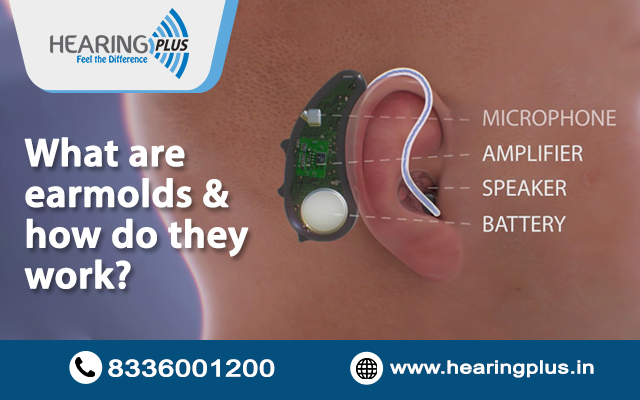
by admin | Apr 26, 2023 | Hearing Aid Clinic, Hearing Aids, Hearing Aids Centre
A hearing aid fitting is a process that involves adjusting the hearing aid to the needs of the patient. This includes selecting the appropriate hearing aid style, programming the device to match the patient’s hearing loss and fine-tuning the settings for optimal sound quality and comfort.
If your hearing aid does not fit you properly, it can lead to various issues. For instance, an ill-fitting hearing aid can cause discomfort, pain and poor sound quality. In some cases, a poorly fitting hearing aid may even cause feedback (whistling sounds). Therefore, it’s essential to get your hearing aid fitted by an audiologist at a hearing aid centre who will adjust the device to fit your ear canal’s shape and size.
Importance of properly fitting hearing aids for better hearing
Here are some points to explain why a hearing aid fitting is necessary whenever buy hearing aids from an ear machine centre.
Customization: A hearing aid fitting ensures that the device is customized to your hearing needs.
Maximum comfort: A hearing aid fitting also ensures that the machine fits your ear canal’s shape and size, providing maximum comfort and minimizing the risk of discomfort, pain and irritation.
Optimal sound quality: Moreover, fitting of a hearing aid is necessary so that it is able to provide the best sound quality for your hearing loss which can improve speech clarity and reduce background noise.
Compatibility: A hearing aid fitting makes sure that your device is compatible with other assistive listening devices or technology that you may use, such as telecoils or Bluetooth connectivity.
Better hearing outcomes: Audiologists of the hearing aids centre in Kolkata ensures that your hearing machine fits you well for better hearing outcomes such as improved communication, increased social interaction and enhanced quality of life.
The process of fitting hearing aids
During a hearing aid fitting, an audiologist of a hearing aid centre will perform the following steps:
Assessment: Your audiologist will review your hearing test results and discuss your hearing needs.
Selection: Based on the assessment, they will recommend hearing aids that are suitable according to your lifestyle and budget.
Programming: The hearing aids will then be programmed by the audiologist.
Fitting: Finally, they will adjust the hearing aids to ensure that they fit comfortably and securely in your ears.
Follow-up: The audiologist will explain how to use the hearing aid, keep it safe from moisture and other maintenance issues. Hence, it is important to schedule a follow-up appointment to ensure that the hearing aids are functioning properly and meeting your needs.
Conclusion
So, before purchasing hearing aids, make sure that it fits you well for better hearing ability.
Patient Review
“Doctors and staff are friendly and helpful. Overall good experience.”

by admin | Apr 19, 2023 | Hearing Aid Trial, Hearing Aids, Hearing Aids Centre
A hearing aid trial is a method by which a patient with hearing loss tests and evaluates different types of hearing aids to find the best solution for their needs. The trial typically involves consulting a qualified audiologist who will conduct a thorough hearing assessment, discuss the available options and recommend hearing aids according to your requirement.
During the trial period, the patient wears hearing aids in various settings and environments to evaluate their effectiveness in different listening situations. The audiologist will then make adjustments to the hearing aids as needed to ensure they provide optimal sound quality and comfort.
The most important factor when selecting a hearing aid is finding one that meets your hearing needs. If you purchase hearing aids without going through the trial period, you may not fully assess the device’s performance, comfort and features before making the purchase.
Important considerations before beginning your hearing aid trial If you’re considering a hearing aid trial, here are some important things to consider:
Understand your type of hearing loss: Different types of hearing loss require different hearing aids to meet specific needs of patients. It’s important to have a thorough hearing assessment by a qualified audiologist to determine the type and severity of your hearing loss before starting the hearing aid trial.
Know about the different hearing aids: There are various types of hearing aids available in the market, including behind-the-ear, in-the-ear, and invisible-in-canal models. Each has its own features and benefits. Discuss your options with an audiologist to find the best fit for your needs.
Consider your lifestyle: Your lifestyle and daily activities should be taken into consideration when selecting a hearing aid. For example, if you lead an active lifestyle, you may need a hearing aid with more features.
Communicate with your audiologist: Your audiologist can help you throughout the hearing aid trial process and ensure that you find the best hearing aid solution for your needs. Be sure to communicate openly and honestly throughout the trial period. One of the best hearing aid clinics in Kolkata has over 30+ qualified audiologists and even provides hearing aid trial at home.
Be patient during the trial period: It may take some time to adjust to wearing hearing aids as they can initially feel uncomfortable or cause sound distortion. It’s important to give yourself time to adapt to wearing them and ask your audiologist to make any necessary adjustments as and when required.
Conclusion
By keeping these important considerations in mind, you can get your required hearing aids to experience improved hearing.
Patient Review
“I greet all the categories of staff of Hearing plus for their excellent behaviour, cooperation and help to all patients visiting their clinic.”

by admin | Apr 12, 2023 | Hearing Aids, Hearing Aids Centre, Hearing Loss Treatment
Do you know that constant exposure to noise can cause hearing loss? An audiologist of a hearing aid clinic what decibel of sound damages the ears.
Sound is all around us, from the loud noises of traffic to the chatter of a busy restaurant. But how loud is too loud? It’s important to know the answer because prolonged exposure to loud noise can cause permanent damage to your hearing. In this blog post, we’ll get to know what level of loudness can be harmful to your hearing from an audiologist of hearing aids clinic.
Understanding what sound decibel can cause hearing issues
Sound is measured in decibels (dB), and the louder the sound, the higher is the decibel. Normal conversation sound is around 60 dB, while a rock concert can be around 110 dB. Exposure to sounds at 120 dB or higher can cause immediate hearing damage. However, it’s not just the loudness of the sound that matters but also the duration of exposure. Sounds that are too loud can cause hearing loss if you are exposed to them for a prolonged period of time.
An audiologist at a hearing aids centre in Bhubaneswar stated that sounds that are above 85 dB can cause hearing loss if you are exposed to them for a prolonged period of time. This includes sounds like traffic and music from headphones. Moreover, if you are exposed to sound above 100 dB, your hearing can be damaged very quickly. Sound at this level is equivalent to a jackhammer or a thunderclap, and it can cause immediate and permanent hearing damage.
Exposure to loud sounds can cause noise-induced hearing loss (NIHL), which can be temporary or permanent. The damage accumulates over time, and the first sign is often a ringing or buzzing sound in the ears called tinnitus.
Signs that your hearing health is at risk
If you are regularly exposed to loud sounds, there are several signs that your hearing health may be at risk. These include:
- A constant ringing and buzzing sound in the ears
- Struggling to hear conversations or other sounds, even in relatively quiet environments.
- Sound seems muffled or distorted and you have trouble understanding speech.
- Aloud sounds or becoming uncomfortable and irritated when exposed to them.
- Experiencing any pain or discomfort in your ears after exposure to loud sounds, it could be a sign of damage.
If you experience any of these signs, it’s important to see an audiologist at a hearing aids clinic as soon as possible. They will evaluate your hearing and recommend the necessary treatment.
Protect your hearing from loud noise exposure
If you want to protect your hearing from loud noise, there are several steps you can take.
- If you are exposed to loud sounds for an extended period, take regular breaks to give your ears a rest.
- When listening to music or watching TV, try to keep the volume at a reasonable level.
- If you know you will be exposed to loud sounds, such as at a concert or in a noisy workplace, wear hearing protection such as earplugs or earmuffs.
Regular hearing checks with an audiologist of a hearing aid centre can help you identify any changes in your hearing.
Conclusion
Remember that hearing loss is preventable, so take care of your ears and avoid loud noises.
Patient Review
“I am too satisfied with hearing plus. Each staff is very good in behaviour.

by admin | Apr 10, 2023 | Hearing Aids, Hearing Aids Care, Hearing Aids Centre, Hearing Loss Treatment
Presbycusis can affect the ability to communicate effectively and have a negative impact on relationships. Let’s know from the expert of a hearing aid clinic.
Presbycusis or age-related hearing loss can have a significant impact on communication and relationships. It can lead to difficulty understanding speech, especially in noisy environments and may cause individuals to withdraw from social situations.
This can result in feelings of isolation, depression and anxiety. Additionally, hearing loss can strain relationships with family and friends, as it may lead to misunderstanding and frustration. Seeking help from an audiologist of a hearing aid clinic in Kolkata can greatly improve communication and social interactions.
How Presbycusis affect communication?
Presbycusis or age-related hearing loss can affect communication in several ways. Here are some of the ways:
Difficulty hearing speech: This condition can make it harder to hear high-pitched sounds and understand speech especially in noisy environments or when multiple people are talking at once.
Misunderstanding: When someone has hearing loss, they may mishear words and phrases which can lead to arguments and miscommunication.
Withdrawal from social situations: People with age related hearing loss may avoid social situations because they find them challenging or embarrassing. This can lead to social isolation and feelings of loneliness, stated an audiologist of a hearing aids clinic in Kolkata.
Frustration: Trying to communicate with someone who has hearing loss can be frustrating for both parties. The person with hearing loss may feel frustrated that they can’t hear well, while the other person may become irritated that they have to repeat themselves or speak louder.
How can Presbycusis impact relationships?
An audiologist of a hearing aids clinic in Kolkata even stated the ways Presbycusis can have a significant impact on relationships. Let’s know them.
Tension: When someone experiences hearing loss, communicating becomes challenging, leading to strained relationships between the affected person and their loved ones.
Strained communication with loved ones: Presbycusis can make it hard to communicate with loved ones such as spouses or children. This can be especially difficult when discussing important topics or emotions.
Misinterpretation of emotions: Hearing loss can make it hard to hear the tone of voice and other nonverbal cues which can lead to misinterpretation of emotions.
Treatment options for Prescubysis
There are several treatment options to manage the symptoms of Prescubysis . Here are some of them.
Hearing aids: Hearing aids are the most effective options that can help make speech clearer and more understandable.
Cochlear Implants: For severe cases of hearing loss, cochlear implants may be an option. A cochlear implant is surgically implanted in the inner ear that directly stimulates the auditory nerve.
Moreover learning communication strategies, such as asking for repetition or using visual cues can also help manage the effects of this condition.
Conclusion
Whenever you face any hearing issues, it is important to seek help from an audiologist. With the right treatment and support, patients with Presbycusis can continue to live an active life.
Patient Review
“I am too satisfy with hearing plus. Very good service. all employees are behaviour is excellent.”

by admin | Mar 17, 2023 | Hearing Aid Trial, Hearing Aids, Hearing Aids Centre
Do you need to buy hearing aids? Make sure to undergo a hearing aid trial before purchasing one. Here’s everything you need to know about a hearing aid trial.
Do you struggle to hear noises and follow conversation? If the answer is “Yes”, you might need hearing aids. But getting a hearing aid can be an important decision in your life. In most cases, it is seen patients purchase hearing aids according to their budget and diverse technologies. However, it is noticed that patients still fail to follow conversations because the hearing aid does not have the requirement according to their needs. Hence, a hearing aid test and trial is necessary to identify the severity of hearing loss and the type of hearing aid required.
Know everything about hearing aid trial
Here are the steps which you must undergo for a hearing aid trial. Let’s know.
- Get your hearing tested
It is crucial for you to get your hearing screened to know the type of hearing loss you are suffering from and its severity. During hearing tests in Kolkata, an audiologist checks all the aspects of your hearing health.
- Diagnosing your hearing loss
Diagnosis of your hearing loss is important as it will help to identify the type of hearing aid required to address your hearing issues. For instance, a person with mild to moderate sensorineural hearing loss may require an open-fit hearing aid to experience a natural quality of sound. However, a patient with severe or profound hearing loss may be recommended a close-fit hearing aid.
- Buying the right hearing aid
After diagnosing your hearing loss issues, the first step is to seek proper treatment and get your required hearing aids. But the question is which hearing aid will be appropriate for you. Before purchasing hearing machines, it is advisable to consult an audiologist at a hearing aid clinic.
During your hearing aid trial, various hearing aids are tested based on your hearing loss to check which one is the most suitable for you. There are different factors which need to be kept in mind while selecting the required hearing aid.
- The type and severity of your hearing loss
- Your lifestyle and working environment
- Your dexterity in handling the batteries of the hearing aids.
While trying on hearing aids, always try hearing aids from different brands and models. Preferring a specific brand or model may not be suitable for you. Thus, you are advised to undergo a hearing aid trial to know the required hearing aid, which will improve your hearing ability and speech perception.
Conclusion
Most patients buy hearing aids without undergoing a hearing aid trial. Always consult an audiologist and wear different types of hearing aids to find the best one for you.
Patient Review
“Excellent service.very good behavior of stuff. Best hearing solution. infrastructure is very good.”
–Jharna Manna

by admin | Jan 30, 2023 | Hearing Aids
Earmolds are commonly used in hearing aids and have plenty of benefits. However, there are many patients who might not know what earmolds actually are and why they are used. Whenever you go for hearing loss treatment, your audiologist will try different ways to maximise your hearing experience.
If your audiologist finds that you have severe hearing loss, you can be recommended hearing aids with earmolds.
What are earmolds?
For people who experience hearing loss at low frequencies and across all frequencies, earmolds can be given to deliver better sound quality. An earmold is made up of silicon and is customised to the shape of your ear. Earmolds can be of different styles and colours depending on what the patients want.
A well-known audiologist stated that earmolds are recommended for patients with severe or profound hearing loss because they channel the sound from the hearing aids directly into the patient’s ear.
While preparing the earmolds, your ear canal will be filled with a kind of wax to cast an impression which will be removed after some time. The procedure might make you feel uncomfortable, and you may feel that your ears are filled with water. The actual earmold will be made from the impression taken.
An earmold generally consists of the following components:
- A sound outlet
- A vent for enhancement of the sound
- A tube to connect the device to the hearing aids
Earmolds are mostly used for BTE hearing aids. It amplifies the sound directly into the ear and also protects the ears from noisy environments.
You can get the best hearing aids in Kolkata along with earmolds at an affordable price with the latest features.
How do earmolds works?
The main purpose of earmolds is to transmit sound directly into the ears without any interference from outside environmental noise. Moreover, it prevents the tinnitus-like symptoms caused by feedback from entering the ears.
Earmolds work in the following ways:
- The microphone in the hearing aids picks up the sound
- The hearing aids then cancel the background noise
- The sound then travels from the tubing of the earmold into the ear
- The seals stop other unwanted noise from entering the ear
So, if you need to buy earmolds, search “Hearing aids clinic near me” and consult the best audiologist who will guide you select the appropriate earmolds.
What are the benefits of using earmolds?
There are several benefits of using BTE hearing aids with earmolds, such as:
- They deliver clear and natural sound
- They help in feedback cancellation
- Patients can control the BTE hearing aids along with earmolds with ease and flexibility
- In children, earmolds help in hearing aid fitting
The majority of hearing loss patients feel uncomfortable using hearing aids. However, hearing aids with a customised earmold will produce an effective result and will serve as the best hearing loss treatment option.
Patient review
“Very polite attitude… Good behaviour.. I am satisfied with her service.. thank you so much”






